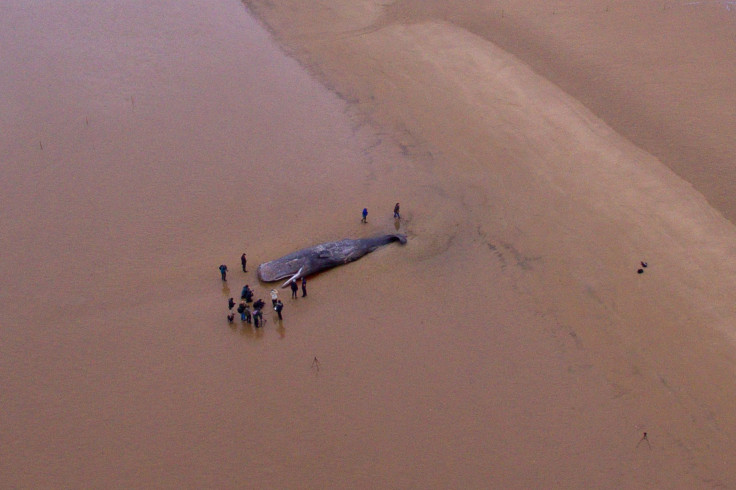Is The Sun Killing Sperm Whales? Scientists Say Solar Storms Confuse Them

The colorful displays of light called auroras might be linked to the deaths of more than two dozen young whales in northern Europe.
Researchers suggest the same solar storms that cause the auroras, which are also known as northern lights, would have created disruptions in Earth’s magnetic field that could have confused sperm whales and led to 29 of them becoming stranded in early 2016. “Whales’ magnetic sense may play an important role in orientation and migration, and strandings may thus be triggered by geomagnetic storms,” according to a study in the International Journal of Astrobiology. If their magnetic sense was thrown off, they could have become lost before getting trapped in the shallow water and died while trying to escape.
The marine victims washed up from the North Sea — located off the northern Atlantic Ocean — onto the shore in Germany, the Netherlands, Great Britain and France between early January and February of last year. All of the 29 sperm whales were male and most of them were young.
During a solar storm, the sun blows charged particles in Earth’s direction that react with the planet’s magnetic field. In northern latitudes, the swirling auroras that appear reveal the patterns and shapes those interactions take, as the charged particles move along the field; the colors come from the particles interacting with different gases in the atmosphere.
The study notes, however, that a solar storm is not just about pretty displays in the sky — it can also disrupt satellites, other communication systems and power grids, as well as temporarily shift magnetic latitudes up to a few hundred miles in some areas. And the effects of solar storms tend to be more intense closer to the poles.
“It seems reasonable that solar storms may impact the magnetic senses of many migrating species,” the study says. “Sperm whales spend their early, non-breeding years in lower latitudes, where magnetic disruptions by the sun are weak and thus lack experience of this phenomenon. ‘Naïve’ whales may therefore become disoriented in the southern Norwegian Sea as a result of failing to adopt alternative navigation systems in time.” Unlucky ones would become “stranded in the shallow North Sea.”
Autopsies performed on most of the whales from this stranded group showed they were healthy.
“The geomagnetic anomalies can give additional (mis)information for orientation for whales and other animals,” according to the research. “Failure of whales to account for disruptions in the magnetic field, such as those triggered by random and abrupt solar storms, may thus lead to temporary navigational errors and disorientation.”

When a whale is swimming in the open ocean, this may not be a problem because the whale can notice they are not oriented properly and adjust. But in shallower water, they can run into trouble.
The scientists say the 2016 sperm whale strandings lined up with solar storms and with subsequent auroras seen over northern Europe. “The current findings thus offer a plausible explanation of the phenomenon of sperm whale strandings, especially in the North Sea and may also be of relevance to other animals migrating through comparable areas.”
Whales are not the only animals that are believed to sense and rely on Earth’s magnetic field. Birds are thought to use it to navigate during their migrations, and it has been suggested that solar storms can interfere with this ability.
BBC News notes that although it cannot be definitively proven that solar storms led to the sperm whale strandings, scientists have investigated this idea in the past.
“It would be difficult to say that ‘yes this was the cause,’ we would be cautious in saying that,” the University of Hannover’s Abbo Van Neer, who performed the autopsies on 16 of the stranded whales, told BBC News. “But it is a valid hypothesis and a potential reason for the stranding.”
© Copyright IBTimes 2025. All rights reserved.





















